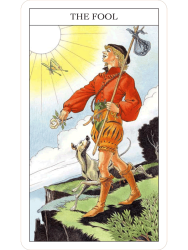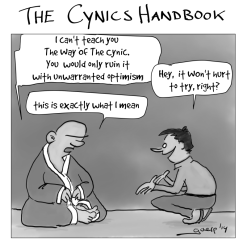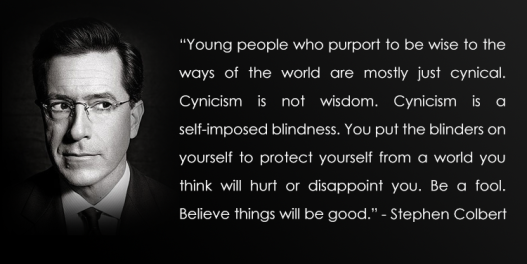First of all, my friends, I want to apologize for being largely silent during the month of February. There are many reasons for that, and I won’t go into any of them here. Suffice it to say, I’m here, get used to it! And I hope I will be publishing much more in the coming weeks. (I have about ten half-finished posts to show for my efforts!)
The reason I showed up here today is that I need your help. Every spring, my film class tackles a philosophical question. The idea behind it is that I believe that cinema, like all art, reflects the mores and preoccupations of our society. I use a “BIG” question to illustrate that. The students debate the question, and then we watch a series of films – hopefully a list that spans multiple cultures and eras – in the hopes of getting some clarity. We discuss the films and then, as a culminating project, the students write a BIG paper in which they reflect on the question and how the films have influenced their own personal perspectives on that question.
Whew! Heavy stuff!
So this year’s question comes from a student aptly named Joy:

Can we be content without being happy?

Who is more content: the naif, who ignores the misfortunes around them in order to maintain an illusion of happiness;

the idealist, whose optimism creates a sense of hope for happiness despite the odds;

or the cynic, whose pessimism denies the possibility of attaining happiness but whose practicality allows them to figure out ways to cope with the bad times? How does our world view inform a person’s choices in life as their options begin to narrow into adulthood?
Whew! More heavy stuff!
What I’m asking of you is this: if you are a lover of films, can you think of any titles that might tackle some aspect of this question? A few titles occur to me, but I’d rather get your take on the subject and can get involved in a discussion below.

I know from my brief experience as a blogger that these sorts of posts often get ignored. Please know that no suggestion is a “wrong” one. I welcome your ideas. All I need is a title and an explanation (in case I haven’t seen it) of why you think this film fits the question. You will get no arguments or criticism from me on any suggestion, just my profound thanks and quite possibly a few follow-up questions (like, is it available to show?)

Thank you in advance for any assistance you can render me. We now return to . . . well, a wait for our regularly scheduled programming!
You ask such an interesting question here, Brad. My first thought was Forrest Gump. So many characters in that movie learn to be content, even though not all of them end up happy. If you’ve not seen the film, I can go into more detail, but I don’t want to clutter up your comment space if you have seen it. Just my $.02.
LikeLiked by 1 person
Thanks, Margot! I have seen the film, and I get your drift! 🙂
LikeLiked by 1 person
Eternal sunshine of a spotless mind. A women has memories of a relationship erased from her mind. She does this as the memories are making her sad. The man also does the same but towards the end of the process he changes his mind as the memories, whilst make him sad, are also really important.
LikeLiked by 1 person
Apologies for the incorrect grammar. Autocorrect on my phone is playing up.
LikeLike
Thanks for all your suggestions! Eternal Sunshine is the perfect movie for this list! I own About a Boy but barely remember it, and I never saw the Will Smith movie although it seems to me it’s based on a true story. Thanks again!
LikeLike
The pursuit of happyness. A struggling father takes steps to improve his fortune and chase his dreams. The focus is on the persuit of happiness, rather than happiness itself. By the way, happiness is intentionally misspelled in the title of the movie.
LikeLike
About a boy. Will Freeman is content with his predictable life. However, after a young boy and his mentaly unwell mother enter his life and turn it upside down, he appreciates the happiness this ends up bringing.
LikeLike
What about AS GOOD AS IT GETS, which puts together the three aporoaches yiu could argue? I think the movie is very flawed but useful. Steve Martin’s THE JERK is a hilarious look at a Candide-like naif … and maybe Billy Wilder’s THE APARTMENT?
LikeLiked by 1 person
Sergio, as I recall, the three main characters could fit the three types of person, which makes As Good As It Gets a great candidate. I love the movie The Apartment – I’m struggling to figure out how it might work with this question, though.
LikeLike
Well, I suppose I was thinking of how CC and Fran approach their lot in life – he takes a potentially cynical but practical view and yet knows what he is doing is wrong. She is at heart an idealistic romantic but can’t cope. In a way though it is the scenes with CC’s neighbours, when they tell him about being a bench, that I thought might make it of use. Have you seen TEQUILA SUNRISE? I did a review of it here: https://bloodymurder.wordpress.com/2012/01/31/tequila-sunrise-1988-tuesdays-forgotten-film/
Good luck Brad 🙂
LikeLiked by 1 person
PS Darn autocorrect – “bench” was originally mensch …
LikeLike
I know it gets criticized for manipulative schmaltziness (not by me, because the movie’s one of my guilty pleasures), but it strikes me that Love Actually is full of examples of people getting and/or settling for different forms of happiness.
LikeLike
I don’t mind the schmaltz at all, John, but I showed the film already to the class last semester. I’m counting on you to come up with some other ideas. Hey, in a weird way, would Out of the Past count?
LikeLike
Misery; Bride of Frankenstein; The Barrets of Wimpole Street; Being John Malkovich; The Truman Show; The Wizard of Oz; King Kong; Lost Horizon; Death in Venice; The Third Man; Murder on the Orient Express; A Star is Born; The Artist; The Kid; Brewster’s Millions; Scrooge; Groundhog Day; Pather Panchali; It’s a Wonderful Life; Psycho; The Best Years of Our Lives; Coming Home; On Golden Pond; Some Like It Hot; Born on the Fourth of July; Deliverance; Raging Bull; Rocky; The Deer Hunter; The Mission; Whatever Happened To Baby Jane; Dumbo; Pinocchio; Snow White & the Seven Dwarfs; Sullivan’s Travels
LikeLike
Um . . . wow! Just . . . wow!!
Thanks for the list, David. Certain titles leap right out at me and say yes. George Bailey’s metamorphosis from optimist to cynic and back again (because he is given knowledge most of us never get) seems perfect.
What is Pather Panchali?
LikeLike
Do you have limits on content? While not explicit, the themes of Dangerous Liaisons might cause a stir in a public high school. But I think it would be a good film to look at for cynicism and idealism and it’s effect on happiness. Valmont’s vanity and cynicism keeps him going back to Merteuil and from embracing (or even admitting) that he’s found love and true happiness with Madame de Tormund. Whereas Merteuil’s cynicism and malice keeps her from making a real effort with the man she truly loves, Valmont, and eventually getting him killed. And their battle ends up destroying the idealists who end up in their web (DeTormund and Cecile).
LikeLiked by 1 person
It’s a great story, Rick. I loved both the film and the play. I have to think about whether these k8ds would get it. I could always show them the teen version with Sarah Michelle Gellar. 🙂
LikeLike
Sergio, I read your review of Tequila Sunrise. I’m not sure how it fits into the question, but now I sure want to watch it.
Thanks for the ideas. You’re such a bench! 🙂
LikeLiked by 1 person
Emma, and/or Clueless. I also just watched the 1960’s Little Shop of Horrors and the 1986 Musical version. Both deal with what it means to be happy. Also the plant in the musical was a completely practical puppet that took 20 puppeteers from the Jim Henson company to operate. No blue screen.
LikeLike
I’ve always felt the film BRIEF ENCOUNTER directly addresses this question. More than any other I can think of.
LikeLike
I have to say the first title to spring to mind for me was Frank Capra’s Lost Horizon. Maybe it’s not for everyone but I think the whole movie is centered around the concept of happiness and contentment, or the spiritual variety that grows out of stumbling upon and gradually recognizing one’s place within the scheme of things, wherever and whatever that may be.
LikeLiked by 1 person
That one sprang to my mind, too, but I forgot to come back and suggest it. I was reminded of this when the email arrived in my inbox a few minutes ago to tell me a new comment had been added here. I thought, “I’ll read the comment, then go suggest Lost Horizon (preferably the original, not the crappy remake),” only to discover . . .
Anyway, if both us reckon the movie’s a suitable candidate I don’t see how Brad can possibly get out of inflicting it on his class.
LikeLiked by 1 person
Couldn’t agree more, John. He has to do it!
LikeLike
It’s not happening, fellas . . .
LikeLike
That’s disappointing. How about Billy Wilder’s Avanti! then? That’s a lovely example of two incomplete people reaching an accommodation with each other and themselves that’s simply delightful.
LikeLike
“The Rainmaker” with Burt Lancaster & Katharine Hepburn? Kate “settles” for a steady-but-dull husband instead of adventurous dreamer Burt. Also the Jane Austen adaptations that point up women’s limited life choices and different expectations–Marianne vs Elinor, Lizzie vs Charlotte and so on.
LikeLike
God, Marty, I love the idea of applying Austen to this question. Every book deals with a woman’s illusions being dashed, causing her exquisite misery and leading her to true contentment. If only there were time . . . Summertime is interesting as she remains a sort of naïf even into late middle age. It’s a great role for Hepburn! Thanks for the suggestions!
LikeLike
GRANDE ILLUSION. DIVA. A NEW LEAF.
LikeLike
Hi Brad — Hope all is well. When I see the prompt, I immediately think of British ensemble director Mike Leigh, whose many films revolve around ordinary human happiness when other characters see life quite differently. HAPPY-GO-LUCKY is probably the most appropriate (and definitely the most recent), but I’m fond of LIFE IS SWEET and the very early GROWN UPS, with Brenda Blethyn delivering a sublime performance.
I’d also recommend Hal Ashby’s BEING THERE: is contentment merely a feature of a simple outlook, and could it be contagious because it allows others to reflect themselves (and their worldviews) in it?
Finally, I’ll throw in a wild card film that is one of my favorites: Powell & Pressburger’s I KNOW WHERE I’M GOING, about a woman determined to manufacture her own contentment by marrying a wealthy industrialist, but then she gets detoured to the Scottish Hebrides and has to reassess her goals and plans.
All best wishes,
Jason
LikeLike